2021-10-12
Chen Chun-fang /photo by Jimmy Lin
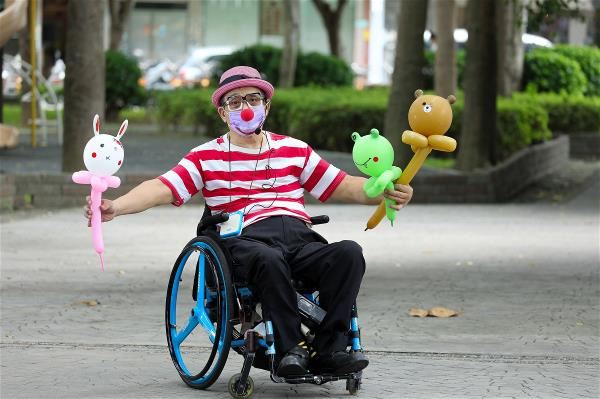
Known as “Grandpa Clown,” Chang Shih-ming is a street performer who suffered a spinal cord injury that left him paralyzed. Sitting in his wheelchair and wearing a clown costume, he uses balloon art to interact with others. Laughter fills the air wherever Chang goes.
When Chang reconnected with the outside world after 16 years of social withdrawal, he founded the Hsinchu City Spinal Cord Injury Association and the Yes.Yes.Yes balloon art workshop. He also became involved in a travel program designed to enrich the social lives of people with physical disabilities. By working to break stereotypes, Chang wishes to help create a society that is friendlier towards disabled people.
It’s noon at a community care center, and Chang Shih-ming is wearing a rainbow-striped clown shirt and comically large plastic glasses. His face mask, which he must wear due to the Covid-19 pandemic, has a huge smile drawn on the front. With a bright red ball on his nose, he has transformed into a goofy clown.
Tie a knot, make a twist, draw a face—in just a few moves, Chang conjures a rabbit, a frog, and other cute animals. He carefully guides his students through every step. Frequent bursts of laughter erupt from the classroom, whose mood is one of joy and warmth. While people with disabilities are often seen as objects of pity, Chang seeks to create a more positive image for them.

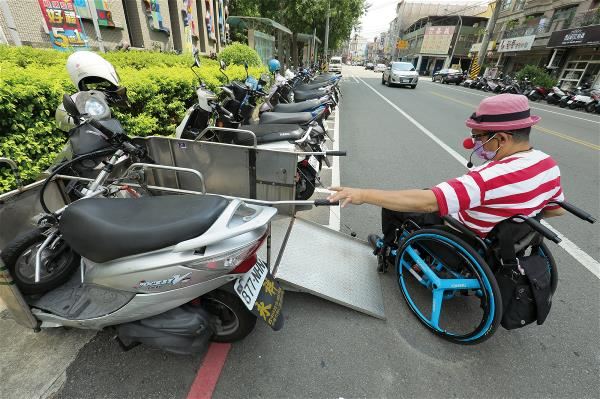
Spreading laughter
Chang Shih-ming, 70, has been dressing as a clown and performing as a street balloon artist for more than a decade. His discovering balloon art was a matter of serendipity. It was while leading a vocational training team at the Development Center for Spinal Cord Injury in Taoyuan that Chang learned that the center was home to a balloon art club.
There, Chang discovered the rich possibilities of balloon art performance. The costs were low: he needed just a bag of balloons, a book, and a pump, and he could easily store the material under his wheelchair. NT$500 was enough to start up in business. More importantly, balloon art brought him a sense of accomplishment. The smiling face of a child who whispered thanks for his balloon made Chang feel valued. He realized that he was capable of giving others joy and contributing to society.
Chang thus went to take the street performance license exam for Taoyuan. In a moment of inspiration, he rented a clown costume to garner more attention from passersby. On the day of the exam, the judges watched him, decked out as a clown, twist and bend his balloons. Noticing that rather than giving strange looks to this performer in a wheelchair, people were happy to approach and interact with him, the judges agreed to issue a license. Subsequently, Chang obtained licenses for New Taipei, Taipei, and Hsinchu City. Every weekend, he performs in streets across Taiwan and earns some tip money. “There’s nothing better than giving others joy while also making a little extra money doing it,” Chang says.
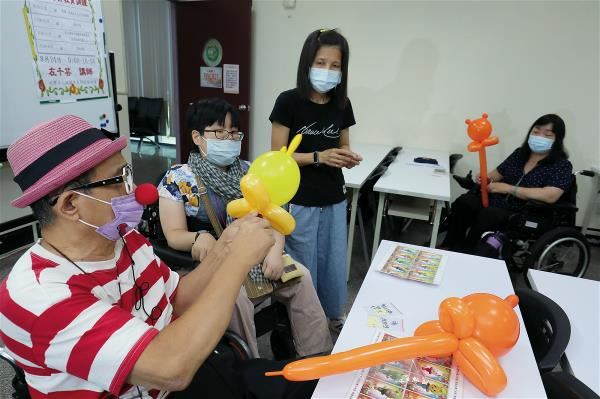
Never to stand again
To promote balloon twisting for his fellow wheelchair users, Chang opened a clown class at the Development Center for Spinal Cord Injury. A student once confessed to him, “Mr. Chang, it’s hard enough being in a wheelchair. I look even more ridiculous as a clown. I don’t want to do it!” Faced with this resistance, Chang knew the student had not yet overcome her feeling of inferiority. “Since I’ll be stuck in this wheelchair for the rest of my life, I may as well accept it. When a person is forced into a hopeless situation, they will find a way to survive. Turning myself into a clown helps me realize that I can be myself and don’t need to be afraid of other people’s discriminatory gaze. I’m fine with being gazed at because I know people are looking at me in appreciation and acceptance. They aren’t looking down on me.” Chang says that dressing as a clown while sitting in a wheelchair is an act of bravery.
As someone who used to be able to walk, yet whose paraplegia forced him to rely on a wheelchair to navigate a world riddled with obstacles, Chang did not always look on the bright side.
The only one in a family of four children to go to college, Chang studied architecture at Tamkang University. He was his parents’ pride and joy. While undergoing military training at Chenggongling during his first year as an undergraduate, Chang noticed something wrong with the reflexes in his left leg. He could not keep up when goose-stepping.
The weakness in his left leg did not get any better. In the first two years of college, Chang went to consult numerous doctors, including practitioners of traditional Chinese medicine, but they never discovered the cause.
In the summer after his junior year, Chang was admitted to a large hospital. The doctor there found a dark spot on a scan of his thoracic vertebrae and suggested he undergo surgery. The surgery failed and his lower body was left paralyzed.
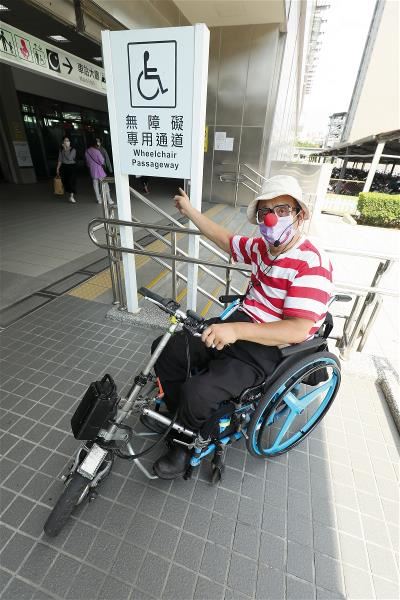
Rebirth
Chang’s parents ran a clock and watch shop in front of Hsinchu City’s Chenghuang Temple. They were relatively well-to-do, and every year they would visit a photography studio for new family portraits. Chang could not reconcile himself to the fact that he had to rely on a wheelchair. His parents, doing their best to protect him, took care of him financially. Under their care, Chang cut himself off from society.
Dejected and downhearted, Chang developed an irregular routine that left him in and out of the hospital multiple times with stomach bleeding. It wasn’t until his eighth stomach bleed, when the doctors had to perform a five-hour emergency surgery and transfuse more than 50 bags of blood, that reality hit him. Having frittered away 16 years of his life, he was determined not to let his remaining time go to waste.
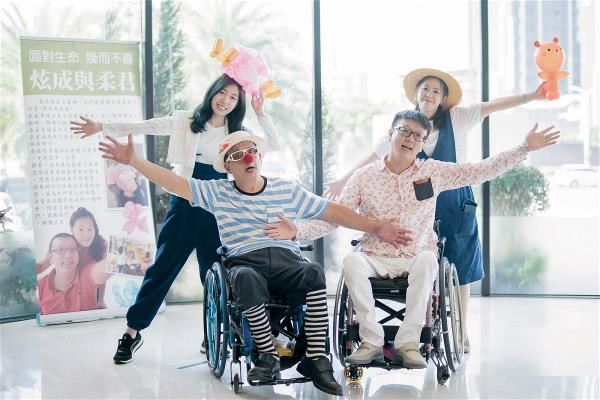
A “twist” of fate
Following the suggestion of the head nurse, Chang went to the Taiwan Provincial Ren-ai Skill Learning Center to acquire computer skills. At the time, the center was only accepting students below 35 years of age. Chang, aged 38, made a heartfelt appeal. The center ultimately made an exception and enrolled him in the class, making him the oldest student there. From this experience, Chang realized that those with disabilities need not be limited by external factors nor fear rejection. With a brave outlook, they will be able to find opportunities in the job market.
Thanks to an opportunity at the Taoyuan Development Center for Spinal Cord Injury, Chang reached a turning point in his life, leaving home to gain independence. He used his own life experiences to help people at the development center to reintegrate into society. Among his students was Liu Xuancheng, who had also suffered a spinal cord injury, and of whom Chang is extremely proud. Liu had failed to secure employment on numerous occasions. Encouraged by Chang, he devoted himself to balloon art. While street performance does not provide a stable income, Liu and his wife journey to locations across Taiwan to promote his art, never ceasing to refine his balloon-twisting techniques. Now, there is no one better at using balloons to make large Marvel heroes or cartoon characters. In recent years, organizations and companies have engaged him to decorate their venues. Liu has found his niche making balloon art.
Chang’s ideal future is one where wheelchair users can twist balloons to prove to others that people with physical disabilities possess skills and can bring joy and laughter to society. Under the tutelage of the Social Business Center of the Taoyuan City Government, Chang and Liu Xuancheng cofounded Yes.Yes.Yes in 2019. This social enterprise offers training to balloon artists with physical disabilities, aiming to open up more avenues into the job market. “In the future, our team of disabled people will participate in the World Balloon Convention and make Taiwan proud of us.” Even at 70, Chang’s eyes light up when he talks about his dream.
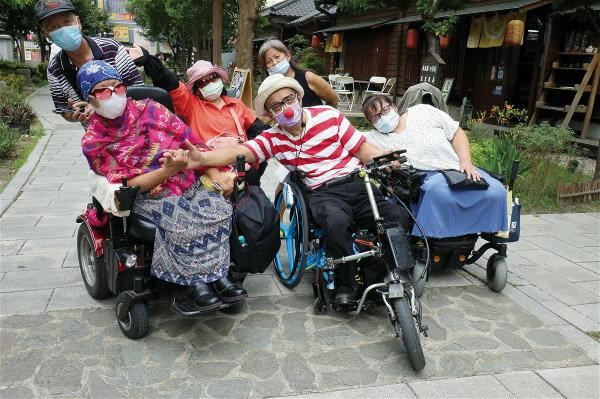
A friendlier society
To promote accessible environments, Chang got involved in the 9453 Friendly Traveler Program, hosted by OurCityLove. He traveled to more than 100 tourist spots to examine local accessible facilities. Based on his findings, he gave informed advice to responsible bodies in order to spur the development of accessible travel in Taiwan. The team has launched Taiwan’s first accessible family travel magazine, which highlights numerous theme-based travel routes, such as a tour of fishing villages in Yunlin and Chiayi and a one-day bus tour in Penghu. Information regarding accessible transportation, lodging, and more, is shared online so that people with disabilities, seniors, and their families can easily plan a trip together and have a good time.
Chang has continued to lead a fulfilling life since retiring in 2017. He accepted invitations from motor vehicles offices to go to numerous bus companies and educate them on best practice for transporting wheelchair users. Since it is the drivers who are in control of the vehicle, he believes that if they can patiently lay out the ramp for wheelchair passengers, help buckle their seat belts, and ensure they reach their destinations safely, it would help tremendously in getting people with disabilities out into society.
Despite the turn of fate that prevented him from becoming an architect, Chang Shih-ming has drafted a blueprint of a brighter future. Going his own way, Chang is building a friendlier society one balloon at a time.
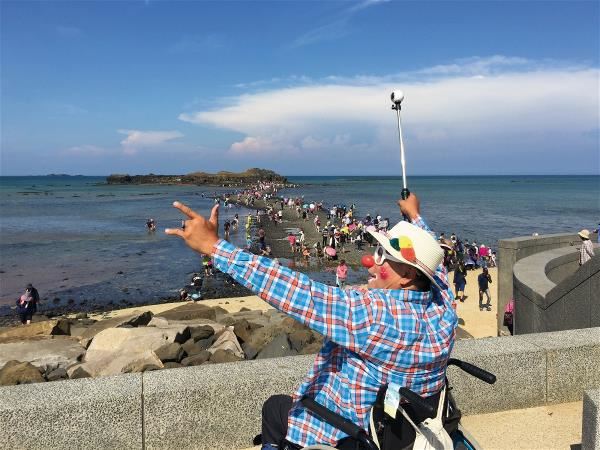
Article and photos courtesy of Taiwan Panorama October 2021





